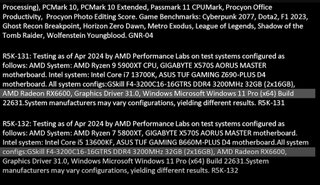Remember those “new” Ryzen 5000 chips that AMD released last week alongside the effectively modern Ryzen 9000 processors? It turns out that the benchmarks provided by AMD for them are terribly misleading.
Youtube channel Equipment unpacked noticed that in Denmark something was wrong with the Ryzen 7 5800XT and Ryzen 9 5900XT game numbers that AMD published to promote the chips.
AMD benchmarks show that the 5800XT beats the Intel Core i5-13600K in many games, while the 5900XT outperforms the Core i7-13700K.
The problem with these claims is multi-fold and it starts like this. AMD’s “new” processors are minor tweaks to existing Zen 3-based chips. The 5800XT is an eight-core processor with specifications very close to the existing Ryzen 7 5700X, while the 5900XT is a 16-core alternative whose specifications are a step above the Ryzen 9 5950X.
The thing is, both “new” chips are largely known quantities, even without detailed third-party testing. But that’s the point. Hardware Unboxed’s own tests show that the Intel 13700K was a total of 36% faster than the AMD 5950X in an average of 12 games, while the Intel 13600K was 28% faster than the 5700X.
This is the age difference between the 5800XT and 13600K, we do not have our own comparison data. But we have an Intel 13600K compared to the newer AMD 7700X. And it’s the Intel chip that wins in games.
Now the 5800XT has a 200MHz higher maximum boost clock than the elderly 5700X. But otherwise it’s identical and that’s just a 4% raise in peak theoretical operating frequency. Opportunities that translate not only into closing the 28% efficiency deficit, but actually comes to the top they are terribly, terribly slim.
So what exactly is going on here? Does AMD choose games that happen to run well on its processors? In fact, it’s even worse. All benchmarks were run using an AMD Radeon RX 6600 GPU. Yes, an RX 6600 GPU was used for all benchmarks on all four CPUs.
This means, of course, that the performance bottleneck in AMD’s test setup will largely be the GPU. And AMD processors win because they perform slightly better against the RX6600 than against Intel chips.

So yes, strictly speaking, if you have a Radeon RX 6600 graphics card, you may find that these AMD processors perform slightly better than the Intel competition. But if you’re using a newer and faster GPU, you’ll almost certainly find the opposite. Because Intel processors are newer in generation and generally run games faster.
So, at best, AMD’s test results for the 5800XT and 5900XT are completely misleading. If a PC gamer purchased any of these processors based on the benchmark results provided by AMD – expecting to get better gaming performance than the Intel processors in AMD’s comparisons – in the expansive majority of likely scenarios and system configurations, they would be disappointed.
Moreover, anyone who is even slightly informed will understand this. So whoever signed off on the benchmark results either doesn’t understand PC and gaming technology or was intentionally trying to mislead. There are really no other options.
Hardware Unboxed called it “AMD lies.” It’s challenging to say that AMD is lying with complete certainty. But whatever happened, this is certainly not AMD’s best time.
It’s a pity, because the 5800XT and 5900XT are not bad processors if you don’t overprice them. It’s good to breathe some life into the elderly AM4 socket. But the chips are what they are, namely based on the Zen 3 processor architecture, which is already 3.5 years elderly and has two generations. Trying to make them into something they’re not is just terribly lame.

